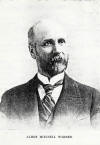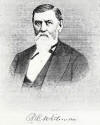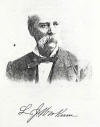|
   
BIOGRAPHIES
Source:
Centennial History of Cincinnati & Representative
Citizens
by Charles Theodore Greve, A. B., LL. B.
Vol. I
Publ. by
Biographical Publishing Company.
Geo. Richmond, Prks.; C. R. Arnold, Sec'y and Treas.
1904
(Transcribed by Sharon Wick)

Almon Mitchell Warner |
ALMON MITCHELL WARNER.
Almon Mitchell Warner, whose home is at No.
2643 Alms place*, Walnut Hills, and whose well appointed
offices are in the Lincoln Inn Court, No. 319 Main street,
Cincinnati, has long been a leading member of the Hamilton
County bar. He was born Mar. 6, 1843, at Plainfield,
Hampshire County, Massachusetts, and has achieved remarkable
success in his profession. Mr. Warner’s
parents, James and Fidelia Warner,
were descendants of noted ancestors among whom was Robert
Bruce, once the idol of Scotland.
Mr. Warner was carefully educated both in
the common and in private schools of Massachusetts, and in
1862 graduated with credit from Williston Seminary, at the
age of 19 years. He entered upon an individual career
just at the time when the country was calling for defenders,
and with youthful enthusiasm he responded, enlisting in
Company H, 37th Reg., Massachusetts Vol. Inf., putting aside
all thoughts of a personal character and hopes of a
professional career. His position in his company was
soon that of 2nd sergeant, and upon being transferred to
Company E, he was promoted to the rank of 1st sergeant.
His regiment was continually at the front and Mr.
Warner took part in 18 engagements, participating with
gallantry in the battles of Gettysburg, Fredericksburg,
Winchester, Petersburg and others without serious injury
until an act of special valor at the battle of Sailor’s
Creek, Virginia, on Apr. 6, 1865, not only resulted in his
being severely wounded, but for his bravery in attempting to
capture the enemy’s flag a promotion to the lieutenancy was
his. His honorable discharge followed, Aug. 28, 1865.
Mr. Warner had recuperated enough by the
beginning of the following year, to enter upon the study of
the law, under the able tutorage of Church & Sawyer, a well
known legal firm of Albion, New York, both members of which
were distinguished in and out of the profession. Admitted to
the bar in May, 1869, Mr. Warner practiced at
Albion until the spring of 1870 when he moved to Leesburg,
Virginia, and still later to Huntington, West Virginia, in
1874 locating in Cincinnati where he has been actively
engaged ever since. Not only has he been a leader in
his profession, but he has also been prominent in Republican
politics, and has been the chosen candidate of the party for
honorable positions.
Mr. Warner was united in marriage on Oct. 12,
1870, at Albion, New York, to Elizabeth H. Densmore,
who is a daughter of Dennis and Christina Densmore.
Two children have been born to this marriage, Maud
Loraine and Carrie Elizabeth. In religious views
the family are Congregationalists.
Mr. Warner has justly been honored on
many occasions in the post of the G. A. R., of which he is a
member, and is past post commander, past department
commander of Ohio and a member of the committee on pensions
of the National Encampment and has held other positions.
He is very popular with old comrades, who alone can realize
the storm and stress of the days of the Civil War. His
associations also with the Odd Fellows and the Masons have
been long, pleasant and honorable. In the former he served
three years as major commanding the battalion of Patriarchs
Militant in Cincinnati; he is past grand, past chief
patriarch and past representative. In every position
and in every relation of life, Mr. Warner has
“fought a good fight’' and he enjoys in the highest degree
the respect of his fellow citizens. His portrait
accompanies this sketch.
Source: Centennial History of Cincinnati & Representative
Citizens
by Charles Theodore Greve, A. B., LL. B. -
Vol. II - Pt. 1 - Publ., 1904 - Page 639
* As of 2020, 2643 Alms Place, Walnut Hills, Ohio has been
torn down. There is a vacant lot with the stairs still
in place. |
|
|
MEYER WEIL.
Meyer Weil, deceased, was one of the early commission
men of Cincinnati, where his entire business career was
spent. He reached a high position in business circles
and amassed a comfortable fortune. He was a very able
man, a tireless worker, and possessed a keen, discriminating
mind which enabled him to succeed where others failed.
Withal his character was above reproach, his thorough
honesty and fairness in all transactions gaining him new
friends at every step in his long and active career.
He possessed a pleasing personality which impressed all who
came in contact with him, and his death was sadly mourned as
a loss to the city, and a personal loss to his many friends
and relatives.
Meyer Weil was born in Surbourg, Alsatia, June
7, 1843, and was one of a family of five children born to
Gabriel and Rosaline C. (Hiep) Weil, who came to this
country and moved in the best Jewish circles of Cincinnati,
and were well known and respected citizens.
Meyer Weil was six years of age when brought to
this country by his parents, who landed at New Orleans, Louisana,
and thence came up the river to Cincinnati. Here our
subject was reared and educated, and about 1868 started in
business with his nephew, Samuel Weil, Jr., the well
known member of the present Board of Public Service, and
I. J. Cannon, under the firm name of Weil,
Cannon & Company, commission merchants. This
became one of the largest and most reliable firms of
Cincinnati, and continued in existence until after the
retirement of both of Mr. Weil’s partners.
He then conducted the business alone from 1900 until the
time of his death. During this long period of
activity, Mr. Weil became widely known
throughout the entire Ohio Valley. He died at his home
in Avondale, Apr. 11, 1903, after a serious illness of two
months, his death resulting from cancer of the stomach.
The news of his demise brought regret to many, especially to
the members of the Chamber of Commerce, in which he had
so long been prominent. A meeting of local commission
men, numbering 100, met at the Grand Hotel and several
addresses eulogistic of his character and life were made.
Appropriate resolutions were adopted and pall-bearers
selected from among his old friends in business. The
commission men attended the funeral in a body, to pay their
last tokens of respect.
Mr. Weil was united in marriage with Betsy
Loeb, a daughter of the well known and highly respected
Lazarus Loeb, one of the city’s prominent Jewish
citizens. To this union were born the following
children: Gabriel M., of the firm of Weil,
Brockman & Company; Charles M.; Henry M.; Samuel M.; and
Rose, wife of Emanuel Bakrow, one of the largest
and foremost cigar manufacturers of Louisville, Kentucky.
For many years Mr. Weil was a member of the Jewish
Synagogue, and was noted for his liberality to all
charitable enterprises. He was one who loved his home
above all else, and all the time not devoted to his business
interests was spent with his family.
Source: Centennial History of Cincinnati &
Representative Citizens by Charles Theodore Greve, A. B., LL. B. -
Vol. II - Pt. 2 - Publ., 1904 - Page 855 |

B. B. Whiteman |
BENJAMIN B. WHITEMAN Source: Centennial History of Cincinnati & Representative
Citizens
by Charles Theodore Greve, A. B., LL. B. -
Vol. II - Pt. 1 - Publ., 1904 - Page 877 |
|
|
THOMAS WILLIAMS, MD.
Thomas Williams, M. D., for many years a well known
physician and an influential citizen of Cincinnati, passed
out of life on May 18, 1902, at the home of his daughter,
Mrs. Charles Lee Mills, at No. 3036 Fairfield avenue.
He was born in Chester England, in 1809. His father
was rector in the historic old cathedral of that city, and
was one of the honored clergy of his day. On the walls
of the old cathedral may yet be deciphered the name of our
subject, carved there when he was a choir boy of 10 years.
His parents had a family of nine children, and he was the
seventh son. His mother died during his infancy, and
during the first years of his life he
was cared for by his grandmother, who at her death left him
to his sister, who also died shortly afterward. He was
then sent to Liverpool to live with an aunt.
Had not the study of medicine attracted him more,
Dr. Williams would have probably become distinguished in
the musical world. In his early youth he was so passionately
fond of music that, after attending some celebrated concert,
lie made himself a violin and picked out without assistance
several long and difficult pieces. Before he was 21,
he brought a young friend with him and came to America,
settling in Poughkeepsie, New York, which he made his
starting point, and visited most of our cities of
prominence. While in Newburgh, New York, he met
Mary Lee Atkinson, a young English girl horn in Leeds,
England, and a granddaughter of Sir Roger Williams,
of Wales. They were mutually attracted and were soon after
married; their home in Newburgh was next door to what had
been George Washington’s headquarters in the
Revolution. Five girls were born to them, all of whom
are now dead, excepting Mrs. Charles Lee Mills, and
are buried in Newburgh beside their mother. (Since the
original preparation of this article, Mrs. Charles Lee
Mills died Dec. 10, 1903.)
Dr. Williams was educated for the life of a
physician, but he found the practice of the profession
entailed too great a strain on his nerves and sympathetic
nature for him to continue in it. He also studied law
and graduated in that profession; being possessed of plenty
of means, he finally drifted
into private banking. Always fond of roving and
interested in seeing our country, he at one time invited
four friends to go with him to San Francisco in a sailing
vessel. They started from New York, had a most
interesting voyage around Cape Horn to Southern California,
and came home overland. Becoming interested in
Cincinnati through the taking of a lot of land on West
Seventh street, in payment of a bad debt, he brought his
family to this city and took steps to improve the property,
building seven houses thereon. He resided in that
locality until his daughter Harriet was married. Mrs.
Williams passed away in 1880, all but one daughter
having previously died, and from then until the time of his
death, Dr. Williams resided with his beloved
surviving daughter and her husband, Charles Lee Mills,
who is one of the prominent real estate men of Cincinnati.
He was taken to Newburgh, New York, for burial, his
grandchildren—Mr. and Mrs. J. Warren Hardenburg, of
Jersey City, New Jersey, and Brownley K. Wilson—and
Mr. and Mrs. Mills accompanying the remains.
From the date of his wife’s death, Dr. Williams
had been an invalid, but so sunny and cheery was his nature
that care for him resolved itself into the greatest
pleasure; so intelligent and bright was his conversation
that one instinctively felt instructed after having been in
his presence. So loving and
gentle was his disposition as to leave behind him only the
sweetest and dearest recollections, and the place left in
his absence will be filled with the tenderest memories; so
peaceful and quiet were his last days that no thought of his
suffering will mar the memory of a well-spent, happy life.
His favorite lines were those written by Isaac Watts:
Were I so tall to reach the pole,
Or grasp the ocean with my span;
I must be measured by my soul;
The mind’s the standard of the man.
Source: Centennial History of
Cincinnati & Representative Citizens by Charles Theodore Greve, A. B., LL. B. -
Vol. II - Pt. 2 - Publ., 1904 - Page 958 |
|
|
WILLIAM WOODS.
The death of William Woods, on September 19,
1902, removed from Cincinnati one of this city’s most
prominent business men, and a citizen of more than usual
worth. Mr. Woods was of Irish extraction, and
his successful business career, even from boyhood, proved
that he inherited many of the best characteristics of that
virile race. His grandfather, William Woods,
whose name he bore, was born in 1760, at Carrigallen,
Ireland, and came to this country at an early age, settling
at Baltimore, Maryland. There the late William
Woods was born, June 21, 1817. Owing to the
reverses of his father and the latter’s early death, the
youth was compelled to leave school and at the early age of
12 years to begin the battle of life. With undaunted
courage he sought work and filled positions as farm boy,
country store clerk, and providently saved his money, thus
accumulating means with which to make his way to a field of
larger operations. At that time, 1839, the great
railway system of the Baltimore & Ohio had not pushed as far
west as Cincinnati, and to reach this city he was obliged to
come by way of the old National Road. His pleasant
manner and evident qualifications soon secured him a
position in a dry goods house, that of Shillito,
Burnet & Pullen, and there his services were
recognized to be of so useful a nature that he was later
admitted to a partnership.
For 20 years Mr. Woods was connected with that
great business house with which he then severed connection
on account of failing health. His business interests
were purchased by the late John Shillito.
After a year of recreation, spent mainly in foreign travel,
Mr. Woods returned to Cincinnati, rejuvenated
and ready to resume business, his opportunity coming in the
shape of a partnership, in the paper business, with his
brother-in-law, the late William H. Chatfield.
Together these partners built up a great enterprise which
grew to be one of the largest in its line west of the
Atlantic Coast. This business association lasted until
the death of Mr. Chatfield, in 1889. An
incorporated company was then formed, of which Mr. Woods
was made president, a position he honorably filled until
his death. Mr. Woods had many other important
business connections; he was, with the late L. B.
Harrison, one of the organizers and first directors of
the First National Bank of this city; lie was president of
the Cincinnati Equitable Life Insurance Company, and had
been identified with many local industrial and mercantile
interests. He accumulated wealth, but in those
legitimate channels which reflect only honor upon its
possession.
In 1841 Mr. Woods was married to Elizabeth
Martin Sharp, a daughter of the late John Sharp,
who was a pioneer citizen. She died in 1885. Six
children survive these parents, namely: Mrs. William
Plankington, of Milwaukee; John S., of
Cincinnati; William H., of New York; Mrs. William
H. Wilson, of Knoxville, Tennessee; Harry F., of
Cincinnati; and Lizzie, now Mrs. Wilmot J. Hall,
of Cincinnati. The second marriage of our subject was
to Mrs. Beach of California, and her daughter is the
wife of Samuel H. Taft, who is a very prominent
lumberman of Cincinnati.
Through an honorable life of 86 years, Mr. Woods
maintained the integrity of character which will ever place
his name high in this city. He was known for his
generous support of all religious bodies and his great
charity. Among other institutions, the Children’s
Home, of which he was trustee since 1864, continually
benefited by his gifts.
Source: Centennial History of Cincinnati &
Representative Citizens by Charles Theodore Greve, A. B., LL. B. -
Vol. II - Pt. 2 - Publ., 1904 - Page 594 |

L. J. Workum |
LEVI J. WORKUM Source: Centennial History of Cincinnati & Representative
Citizens
by Charles Theodore Greve, A. B., LL. B. -
Vol. II - Pt. 1 - Publ., 1904 - Page 953 |
   
|